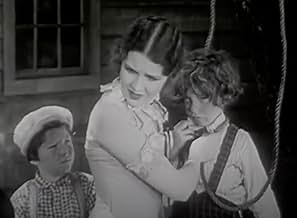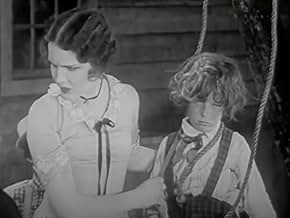A good-natured cowboy who is romancing the new schoolmarm has a crisis of conscience when he discovers that his best friend is engaged in cattle rustling.A good-natured cowboy who is romancing the new schoolmarm has a crisis of conscience when he discovers that his best friend is engaged in cattle rustling.A good-natured cowboy who is romancing the new schoolmarm has a crisis of conscience when he discovers that his best friend is engaged in cattle rustling.
- Awards
- 3 wins total
- Saloon Singer
- (uncredited)
- …
- School Student
- (uncredited)
- Minor Role
- (uncredited)
- Student
- (uncredited)
- Fred
- (uncredited)
- School Student
- (uncredited)
- Bug Ears
- (uncredited)
- School Student
- (uncredited)
Featured reviews
Here, the narrative is always direct and to the point, never losing sight of what needs to come next to get to the end. The scenes are short, in a blunt style that reminds of the silent era rather than of more modern movies, but that's part of the charm when you watch it now, almost a century after it was filmed. Nevertheless, Victor Fleming makes good use of the newfound ability to use dialogue to tell an effective story.
The quality of the prints that have reached us is not perfect, but good enough to appreciate this early western, from just when Hollywood was starting to use synchronized recorded sound.
Virginia-born cowhand Cooper woos schoolmarm Brian in small Wyoming town, tangles with roughneck outlaw Huston. First talkie for both Cooper and director Fleming, adapted from the book of the same name (considered one of the first true western novels), which had already been turned into a play and a pair of silent movie versions. Cooper struggles with the accent, but cuts an upright, stoic figure even this early in his career; Huston is barely recognizable but makes the grade as an appropriately hissable black-hat. Uneven pacing in the first half, including a few obvious instances of padding (such as the baby-swapping prank), gives way to more compelling later episodes, including a harrowing resolution to a difficult decision the protagonist makes in regard to some cattle rustlers. Even in its restored format, the picture and sound quality of current prints is somewhat lacking, but the movie is still a worth a watch for anyone who enjoys old-timey oaters.
62/100
Some things are rather obvious Western clichés, such as the fact that the hero - The Virginian (Gary Cooper) - is always wearing a white hat and generally a light colored shirt. Trampas (Walter Huston), the villain, is always wearing a black hat and black shirt and has a kind of Yosemite Sam black mustache that is so large and cartoonish that Walter Huston is almost unrecognizable underneath it. Steve (Richard Arlen), the Virginian's friend, starts out wearing gray looking clothing. This indicates Steve is no hero but not an outright villain either - he just longs for some easy money. He wears more and more black as Trampas seduces him with the possible big scores of cattle rustling. Then there's the famous line "Smile when you say that" uttered by the Virginian to Trampas. Many people think that line originated here, but it was used in westerns before this. Among those that still exist there's 1925's "Go West" with Buster Keaton being given this command and who would comply if only his facial muscles would let him.
However, Paramount, the studio that in the early talkie era employed Lubitsch, Chevalier, and Dietrich and made so many sophisticated precodes was also capable of making one of the best of the early sound westerns. The emotions here are real - including the hanging of some rustlers, some who meet their end with courage and others who meet it with cowardice. Those hanging them are without malice - it is just something they have to do or else they'd be overrun by the lawless and starve to death.
Civilized America is symbolized by schoolmarm Molly Stark (Mary Brian), imported from Vermont to teach the pioneers' children and increasingly horrified by the savagery of the place. She just doesn't get that you can't expect some imaginary police force to come to your rescue. The romance between her and the Virginian has many parallels in "High Noon" made 23 years later.
Not to say this one is all serious though, there are plenty of laughs to be had especially in the first half of the film. Especially charming and funny is the scene where Molly and the Virginian discuss Romeo and Juliet with the Virginian giving insight into the soul of a pioneer with his interpretation of the story. Then there's Eugene Palette as a cowpoke. Palette like Cooper had been around during the silent era, but the coming of sound increased their value as performers. I'd recommend this to fans of the early talkie whether Westerns are normally of interest to you are not. This is really a good and interesting film.
One such star was Gary Cooper. Coop had been around a while, working his way up from bit parts in the silent era, eventually garnering a few lead roles but not making a huge splash. The Virginian was his third sound picture but it was the one to make him a star. The title role allows him to show off the two main facets of his appeal – an assertive (but not uncouth) manliness, and a charming shyness around the opposite sex. However it is the quality of his voice that completes the persona, one of the warmest and most trustworthy voices ever recorded. You would happily follow that voice into battle, or let it talk to your kids. Such is Cooper's effortless demeanour and naturalism, you could believe he is an old pro, and he shows none of the stiltedness associated with early talkie performances.
On the other side of the camera we have director Victor Fleming, a man who has been largely ignored by film historians despite his importance, although thankfully that trend is starting to be reversed. Fleming did not compose the most elegant shots or weave in clever bits of symbolism, but his pictures are almost invariably excellent. His overriding principle seems to have been to never let the audience get bored. It's documented that Fleming coached his actors a fair bit, and it appears the main thrust of his coaching was to make them act at a snappy pace. There are few pauses in a Fleming picture, and sound is particularly useful to him, because we can hear the actors spit their dialogue at each other or punctuate the drama with gunshots and slammed-down whiskeys. Whenever a scene threatens to drag, Fleming literally keeps it moving. For example, when Cooper and co. first meet Mary Brian, the train she is on keeps chugging along, keeping some constant movement in the shot. Whenever the actors stand still, he has a horse or an extra trot past in the background.
But Fleming is wise enough to know when to calm things down, and indeed the more sedate scenes have a greater impact after the usual flurry of action. When Cooper and Brian sit together among the trees, the only movement is the wind gently rustling their clothing, giving a quiet tenderness to the moment without quite allowing things to be completely still. The real highlight is the overwhelmingly poignant hanging scene, composed almost entirely of facial close-ups, highlighting the different emotions. The sequence seems eerily drawn out, but again without the drama slowing to a standstill.
The view of the Old West we get in this version of The Virginian is not quite the romantic evocation of freedom tinged with danger that we normally see in the genre. While the picture does display a kind of moral simplicity (notice for example how all the good guys wear white, and the bad guys black, with the occasional moustache just to clarify) it is an incredibly mature and almost bitter portrayal. Fleming, Cooper and the rest of the cast have really brought out the tragic aspects of Owen Wister's novel, the sense of loss and betrayed friendship. But this is far from a melancholy meditation. They have also given punch and excitement to the presentation, something which works equally well for action sequences like the tense final standoff, as it does for dramatic scenes, such as the verbal showdown between Mary Brian and Helen Ware. You will not be bored for one minute. And who says the talkies were static?
Did you know
- TriviaGary Cooper's first all-talking film. He felt that sound would ruin him, believing his voice was not adequate to the task. This film turned him from a promising young leading man into a star, although he was not considered a superstar until L'extravagant Mr. Deeds (1936).
- GoofsWhen the posse spots the rustlers, The Virginian says that the posse will split into three parties, then splits them only in two.
- Quotes
Trampas: Well, who's talkin' to you?
The Virginian: I'm talkin' to you, Trampas!
Trampas: When I want to know anything from you, I'll tell ya, you long-legged son-of-a -...
The Virginian: [Trampas stops talking abruptly as the Virginian's pistol is pressed against his abdomen] If you want to call me that, smile!
Trampas: With a gun against my belly, I - I always smile!
[He grins broadly]
- Alternate versionsThis movie was also issued in a silent version, with film length of 2257.65 meters.
- ConnectionsFeatured in La ville du diable (1937)
- SoundtracksPop! Goes the Weasel
(uncredited)
A 17th-century English children's song
Played at the dance
- How long is The Virginian?Powered by Alexa
Details
Box office
- Budget
- $425,000 (estimated)
- Runtime
- 1h 31m(91 min)
- Color
- Aspect ratio
- 1.20 : 1
- 1.37 : 1

































